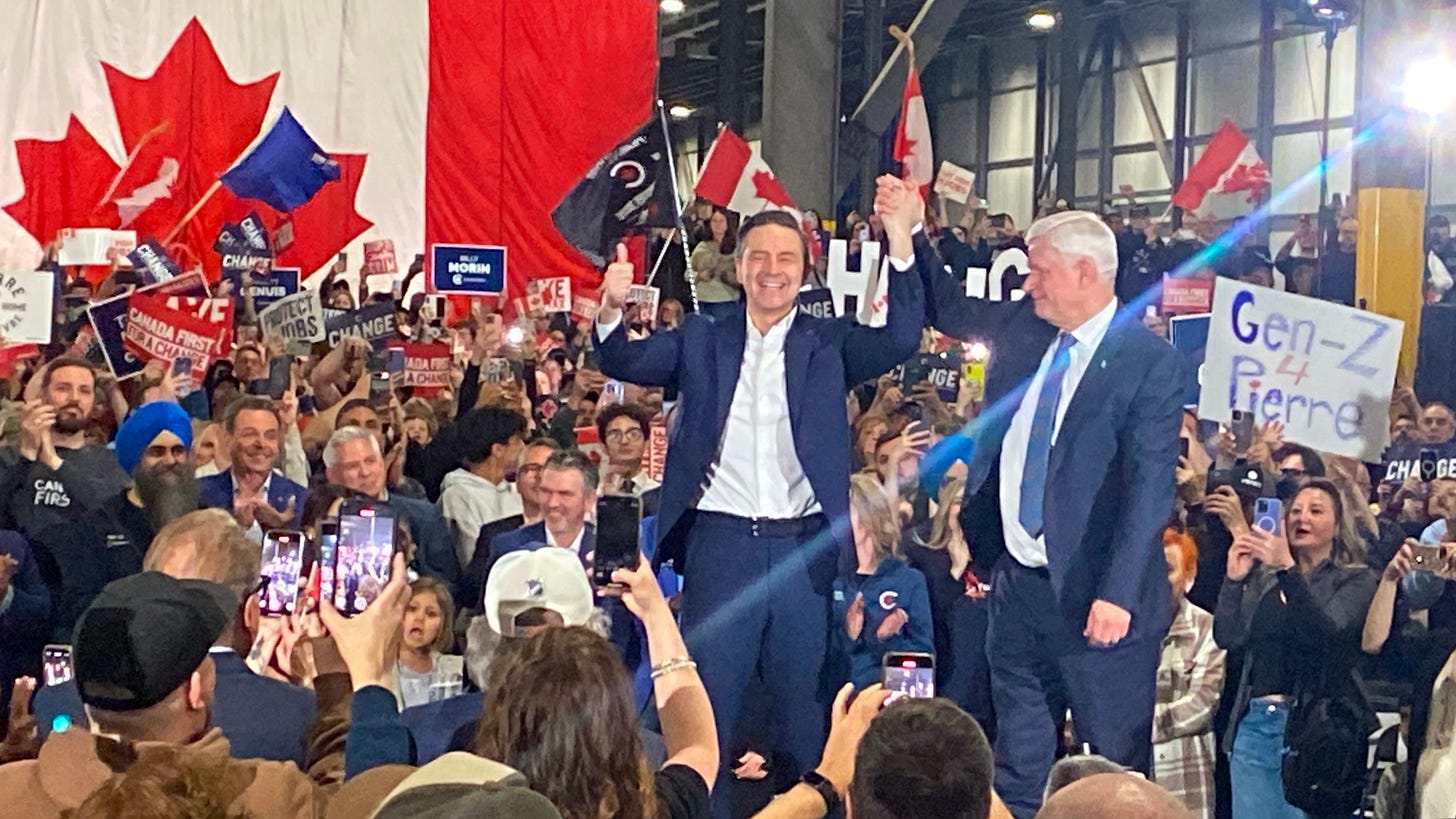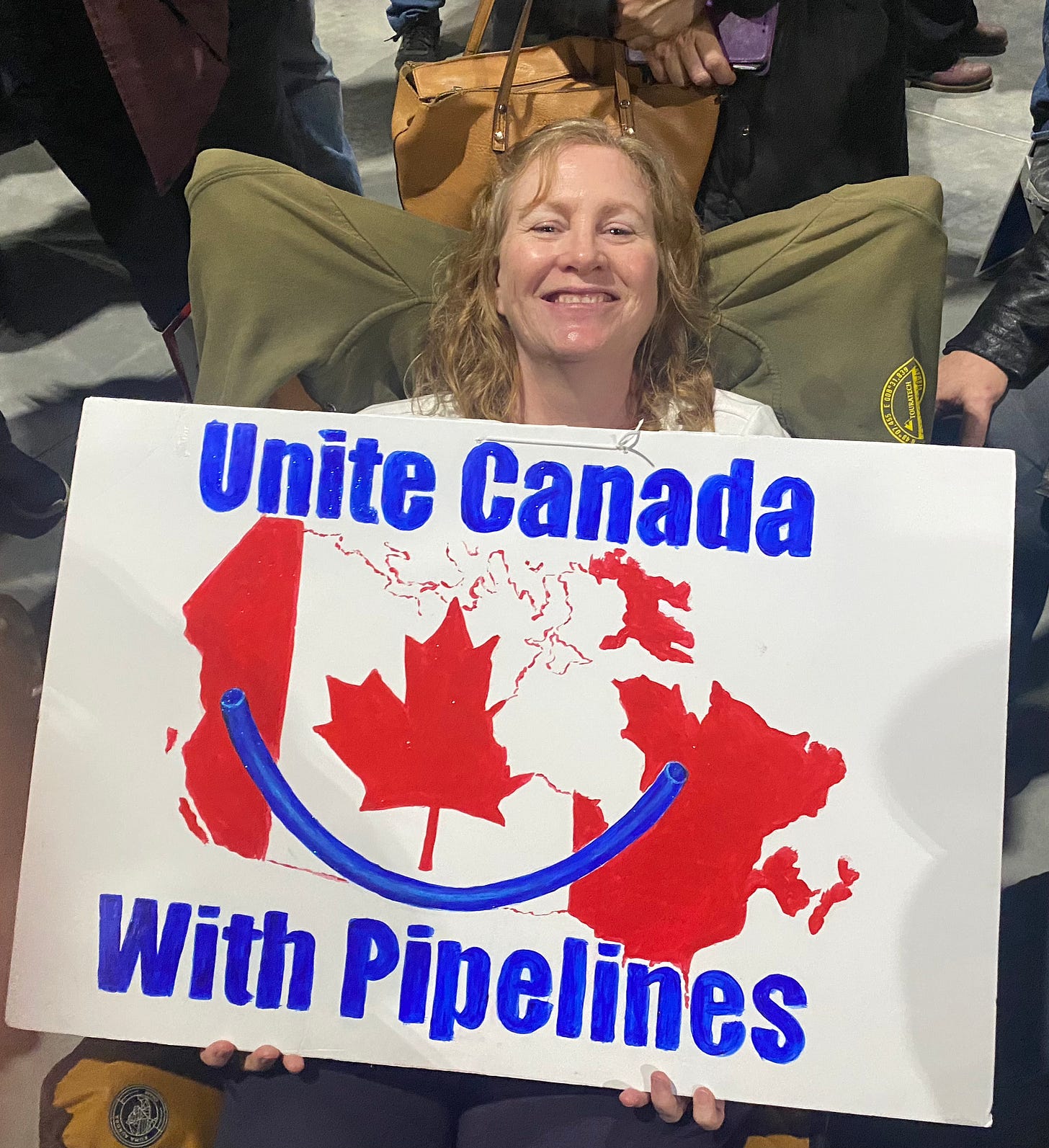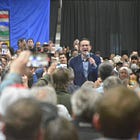My Evening with Pierre and Stephen
Floundering in the polls, the Conservatives brought out former prime minister Stephen Harper for their Edmonton area Canada First rally.

My main interest in going down to Nisku to attend a Pierre Poilievre Canada First rally was to see how his stump speech has evolved since I saw Poilievre speak to a packed Calgary gymnasium when he was beginning his ascent in the polls in 2022.
At the time, I proclaimed him the “Canadian conservatism’s future.” A lot has changed since then.
In just the past six months, we’ve seen the re-election of U.S. president Donald Trump, Justin Trudeau’s resignation, Mark Carney’s landslide victory in the Liberal leadership race, Trump’s tariffs and annexationist threats, and an ensuing wave of Canadian patriotism the likes of which I’ve never seen before.
The Conservatives are still doing quite fine in the polls, averaging 37.2% per CBC Poll Tracker, but with the progressive vote consolidating around Carney, to the detriment of the NDP, Greens and the range of debate in Canadian politics, the Liberals have an almost seven point lead with 43.9%.
Carney has so far successfully positioned himself as a steady hand that will navigate Canada through the crisis in relations with our far more powerful neighbour.
So what’s a floundering Conservative campaign to do? Rally the troops just outside the capital city of the provincial Conservative heartland.
When former prime minister Stephen Harper was announced as Poilievre’s opening act, my interest was piqued further.
Many people who are left-of-conservative, including some valued Orchard readers, seem to think of Harper as the puppet master manipulating conservative politics in Canada from behind the scenes.
The reality, I strongly suspect, is far more mundane. Harper is the father of the modern Conservative Party of Canada, which he was able to bring to power for nine years.
Given his success in making the hard-edged prairie populism of the former Reform Party palatable to swing voters in the suburbs of Toronto and Vancouver (with a lot of help from Jason Kenney), Harper holds significant sway within the party.
It’s no different from Jean Chretien’s influence within the Liberals, which is considerable.
Most of the Poilievre supporters I spoke to pushed back against the notion that this election will be defined by Trump’s annexationist threats, attempting to compartmentalize Trump’s actions from developments in Canadian politics.
“Nobody here voted for Trump, [nor] did he want anyone here to vote for him,” said Milt Miller, a rally-goer I spoke to while in line to get inside the vast warehouse where the rally took place.
“He’s going to do what he wants. We’re going to have nothing to say about it, so we need to look after this ship here.”
Immediately before entering the building, I spoke to Kevin Kerr, who came to the rally with his dog Mia and a Canadian flag.

Despite his display of Canadian patriotism, Kerr said that Canada being annexed by the U.S. “wouldn’t necessarily harm us.”
“I would love to remain Canadian, but we are brothers,” he said referring to the U.S., “and let’s face it, the United States has been protecting us for a very long time.”
Regardless of whether Canada is annexed or not, he’d like to see Canada increase military expenditures. Poilievre has committed to increasing Canadian military spending, but hasn’t said by how much.
Kerr was the only person I spoke to who expressed any amenability to Canada becoming part of the U.S.
Zoe Nixon (no relation to Calgary Confederation Conservative candidate Jeremy Nixon, or his brother, Alberta’s minister of seniors, community and social services Jason Nixon) showed up to the rally with a lawn chair and a sign that reads Unite Canada with Pipelines, with a pipeline making a smiley face on a map of Canada.

She said Trump’s annexationist rhetoric is just him making “a power play to show that he's a strong leader.”
“I don't really think it had anything to do with Canada in the beginning. It's basically the United States looking out for themselves and trying to make themselves strong again, and we just got caught in the crossfire,” Nixon said.
Librarian Rachel Dueck brought a sign that showed Poilievre riding a surfboard in a suit and tie while eating an apple, a reference to his now-famous dressing down of an ill-prepared reporter who asked whether he is following the same populist playbook as President Trump.

She told me Poilievre’s consistent “common sense policies and ideas” will help Canada weather the “11th hour” tariff storm, referencing Poilievre’s support for tax cuts in general and his promise to axe the GST from the sale of cars made in Canada in particular.
“We want to keep our money in our own pockets. Lowering taxes allows businesses and people to spend a minute the way they want to.,” Dueck explained. “They're going to put money back into the system and our economy is going to be better for it.”
Don Vaulencu suggested that a more conciliatory approach to Trump would better protect Canadian interests.
“I wouldn’t impose tariffs, because it’s a child’s game of tit for tat,” Vaulencu explained. “Honestly, whoever the prime minister is, you’ve got to sit down with [Trump] and work it out. Face-to-face communication solves problems. Trump needs Canada more than he thinks he does.”
There was a who’s who of Edmonton conservative bigwigs in attendance at the Poilievre rally. Even disgraced former provincial justice minister Kaycee Madu made an appearance.
But there was one notable absence—Premier Danielle Smith, although I did see her press secretary, Sam Blackett, on his way out.
The reason for her absence is no doubt the result of the headaches she’s caused federal Conservatives over the past couple of weeks for being the clearest link between their movement and MAGA Republicans.
Many, if not all, of the Conservatives’ Edmonton area and northern Alberta candidates were present. I spotted Garnett Genuis (Sherwood Park-Fort Saskatchewan), Kerry Diotte (Edmonton Griesbach), Michael Cooper (St. Albert-Edmonton) and Arnold Viersen (Peace River-Westlock).
Tim Uppal, the incumbent MP for the now-defunct Edmonton Mill Woods riding who’s running in the new Edmonton Gateway riding, was the evening’s emcee.
“You know the mainstream media isn’t going to give us attention,” Uppal said while standing right across from throngs of reporters, including those from the Canadian Press, Global News, the Edmonton Journal and Poilievre’s favourite punching bag, the CBC.
The first speaker Uppal introduced was Arnie Stadnick, the international VP for Canada of the International Brotherhood of Boilermakers.
Receiving the Boilermakers’ endorsement on March 24 was a potent symbol of Poilievre’s effort over the past few years to court union members.
The interesting thing about Stadnick’s remarks is that he barely mentioned the working class. Instead, he spoke mostly about the “demise of our economy for the last 10 years,” referring to “issues like infrastructure, illegal imitation, crimes committed by repeat offenders, shortage of affordable housing and taxes, specifically the carbon tax.”
“Canada aggressively works hard reducing CO2 emissions, but our efforts to reduce while others get to produce is frustrating,” said Stadnick. “Hypocrisy at its worst.”
This isn’t even hypocrisy by its loosest definition.
Closer to hypocrisy would be the fact that Canada boasts about reducing its CO2 emissions domestically while offloading its emissions to the rest of the world through exports—a trend Poilievre wants to accelerate.
After Stadnick’s remarks, Enoch Cree Nation Chief Billy Morin, who’s running for the Conservatives in Edmonton Northwest, led a rendition of O Canada. In what’s now become a tradition at conservative gatherings, attendees emphasized the anthem’s old in all thy sons’ command lyric.
Stephen Harper, who served as Canada’s prime minister from 2006 to 2015, doesn’t give a lot of public speeches these days, at least not in Canada.
But this election puts Harper, who worked with Carney when the Liberal leader was governor of the Bank of Canada from 2008 to 2013 and hasn’t denied reports that he attempted to recruit him as finance minister, in a unique position.
“I am the only person who can say that both of the men running to be prime minister once worked for me and in that regard, my choice without a hesitation, without equivocation, without any shadow of a doubt is Pierre Poilievre,” said Harper.
The way he spoke about Poilievre on Monday was less like a political underling and more like a son:
The first time I met him, I could see that he was smart, articulate, possessing tremendous passion for our country and strong convictions about sound public policy. In 2004, during the time of my leadership, Pierre’s parliamentary career began. He went progressively from a backbench MP to a parliamentary secretary, to a junior cabinet minister, to a senior cabinet minister, and, of course, to party leader.
And in all of those roles, he worked, he fought and he learned, because it is not just that Pierre excelled in all of those roles. In all of them, he grew. He got better and better.
Friends, don't let anyone tell you that he was born to be prime minister or that he can just somehow parachute into the job fully prepared. Political experience, elected, accountable political experience, and the capacity for growth with that political experience, that is what Pierre has demonstrated for two decades, and that is the single most important characteristic a prime minister needs.
Taking a dig at Carney, Harper referred to himself as the “guy who actually did lead Canada through the global financial crisis.”
While acknowledging that there’s “no sugarcoating” the threat from the U.S., like most of the attendees I spoke to before the event, Harper attempted to steer the conversation from the uncomfortable territory of U.S.-Canada relations.
“Falling living standards, declining employment and housing opportunities, rising crime, the growing divisions between our regions and our people. These were not created by Donald Trump, they were created as policies of three Liberal terms, policies that the present prime minister supported,” said Harper.
Poilievre’s speech was punctuated by chants of his campaign’s Bring it home slogan, an appropriately nostalgia-tinged refrain.
The Conservative leader called the rally the “biggest political gathering of the 21st century,” which couldn’t have possibly been true. Although with possibly upwards of 10,000 people in attendance, it could very well have been the biggest Canadian political gathering of the past 25 years.
After opening with an account of his upbringing in Calgary and periodic youthful trips up to Edmonton, he expressed a self-serving, rose-tinted view of the late Harper years, in which taxes were low, budgets were balanced and criminals were locked up.
Gone was the talk of Justinflation for obvious reasons, but Poilievre’s Plan B is to identify Carney as Trudeau’s political heir.
There is some truth to this. Trudeau did try twice last year to recruit Carney as a Cabinet minister. But so did Harper more than a decade ago.
“The Liberals are trying to pull a fast one. They have a very simple strategy in this election, and here's what it is—make you forget about the last 10 years,” said Poilievre.
“Everything they do will be about bringing collective amnesia of all the damage they've done. The first trick they've tried is replacing Justin Trudeau with his economic advisor and hand picked successor, Mark Carney.”
He accused the Liberal leader of “taking credit for things he did not do,” presumably referring to removing the consumer carbon tax, which Carney very much did do, “but refusing to take responsibility for the things he actually did,” presumably referring to things he couldn’t have possibly done because he wasn’t in government.
Poilievre claimed Donald Trump actually wants Carney to win, based on a Fox News appearance in which Trump said he doesn’t care if Carney or Poilievre wins. He accused the Chinese Communist Party of campaigning for Carney, despite Canada’s election interference watchdog alleging that Chinese government-linked accounts were spreading both positive and negative narratives about Carney.
Poilievre then gave the mic to country singer Brett Kissel, who was seated next to Harper, to sing his praises, promising that Poilievre will usher in a “brighter future … not just for us, but for our kids and grandkids.”
After that interlude, Poilievre rattled off a bunch of previously announced policies, most of which consisted of tax cuts of some sort—removing GST from the purchase of autos made in Canada and homes worth less than $1.3 million, eliminating the capital gains tax for investments made in Canada, scrapping the industrial carbon tax, etc.
He promised to invest in nuclear reactors to power AI and make it easier to build new fossil fuel infrastructure, to invest in the skilled trades and repeal Liberal bail reforms.
About halfway through Poilievre’s speech, I simply got bored, as it became increasingly clear that Poilievre was using stale material.
He complained about “tearing down our statues,” as if it were still 2022. He told a joke about building affordable housing where the CBC’s Toronto headquarters used to be, which I found funny when I first heard it three years ago.
And the less that’s said about his attempt at crowd work with rally-goers who work in the trades, the better.
Those who already like Poilievre were probably quite impressed by the rally and found the Conservative leader engaging.
That won’t be enough to fix Poilievre’s stagnant polling numbers, but increasing his support wasn’t the rally’s purpose—it was to fire up the base and, with Harper’s presence, remind them that after 10 years in the political wilderness, a Conservative government is possible.
So is Poilievre’s style of politics still Canadian conservatism’s future? I suspect so.
Even if he loses, which appears increasingly likely, the Conservatives will find a new emissary for his political agenda—perhaps someone who is a genuine political outsider and doesn’t read from the same script three years later.
Carney’s seeming untouchability won’t last forever, especially as the economic impact of Trump’s new tariff regime is increasingly felt.
It’s not inconceivable that by the 2029 federal election, we’ll be back to square one, with a wildly unpopular Liberal prime minister—and an international banker to boot—who’s regarded as completely out of touch with the material realities of working people.
Time will make the ground only more fertile for the forces of reaction.



Classic populist crap.
Blame the last 10 years of global issues on the previous government. Astounding how many are unaware of what's going on elsewhere..... and get sucked in by TV commercials on sports networks.
"Justin" did not cause the pandemic, the war in Ukraine, the climate change caused droughts, fires, floods, storms and they're costs in food and rebuilding, the flood of refugees from countries we, the west, have put into dictatorships (Syria 1947, Iran 1952, 1948, and on and on.
Let's blame the carbon tax (proven not to impact inflation or cost most low or mid income people anything.
The parallel's between PP's and Trump's campaigns is striking.
"Time will make the ground only more fertile for conservative reaction". That's what I fear as well...that we may be going down the same road as America, but just an election cycle later.
PP may lose, but his agenda has scrapped a tax that wasn't one for the majority, moved the Liberal party to the right, as well as toward a possible majority.......and threatens to decimate third parties that serve to keep us less polarized and more protected than the people in that capitalist/fascist gulag to the south of us.
We need new ideas and new policies. Tinkering around the edges of a dying neoliberal order only will delay the inevitable.